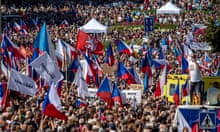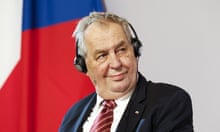The ghosts of the past are returning to haunt the Czech Republic’s communists just as they become closer to gaining power than at any time in the past 30 years.
A month after agreeing to prop up a minority coalition government led by the country’s second-richest person, Andrej Babiš, the once all-powerful Communist party of Bohemia and Moravia (KSČM) is being confronted with one of its most baleful legacies: the brutal crushing in 1968 known as the Prague Spring.
The forthcoming 50th anniversary of the Soviet-led invasion of what was then Czechoslovakia is awakening renewed hostility towards the sole viable communist party of the former eastern bloc.
In 1968 Alexander Dubček, leader of the Czech Communist party, was introducing liberal reforms, but Moscow and other Warsaw Pact countries considered he had gone too far in his pledge to deliver “socialism with a human face”, changes that included abandoning censorship and allowing free speech.
The ensuing crackdown, involving the Soviet-led invasion, ushered in a period of hardline repression that lasted until Czechoslovakia’s Velvet Revolution of 1989, which ended the communists’ 41-year rule.
Some Czechs see a direct link with the current party. They suspect it of acting as a “trojan horse” for the government of the Russian president, Vladimir Putin, by backing the Kremlin’s foreign policy and helping it meddle in domestic Czech politics.
Suspicions have been further aroused by the communist background of the prime minister, Babiš, who is believed to have been a one-time agent for the Czechoslovak secret police, the StB, and the pro-Russian views of Miloš Zeman, the Czech president who has long advocated the communists’ return to the political mainstream.
“There are many connections,” said Jiří Cihlář, 53, a Prague estate agent who accused today’s communists of seeking to weaken the Czech Republic’s membership of Nato and the EU. “Today’s communists are fanatical supporters of contemporary Russia and Putin. If you compare the Soviet Union’s imperial policy of the ’68 invasion with Russia’s current policy, the substance remains the same. Only the means have changed.”
Marek Navrátil, 24, a human resource specialist for NGOs, added: “If you look at their leaders’ statements, most of them say the Soviet Union liberated us and that it was friendly help intended to bring stability.
“If the same thing happened today, it’s likely they would have the same reaction. You can see it in their defence of Russian foreign policy and their support for the annexation of Crimea and eastern Ukraine. There’s a pattern connecting what’s happening today with ’68.”
The KSČM, a successor to the Communist Party of Czechoslovakia founded in 1921, refutes such accusations as a falsification of history, fabricated by opponents to demonise it and present-day Russia.
The party’s leader, Vojtěch Filip, 63, a lawyer who joined the party in 1983 at the height of the cold war, spoke to the Guardian in the Czech parliament. In his office a sign on the wall in English read: “Where nothing goes right, go left.”He insisted that Russia hadplayed little part in the invasion.
“One hundred per cent [the history of 1968] is being falsified. Nobody will write that the whole idea is being based on the position against Russia,” he said. “But the politburo of the Soviet Union at that time had only one pure Russian, and he voted against [the invasion]. [The Soviet leader Leonid] Brezhnev was from Ukraine. The major force of the invading armies were Ukrainian.”
Some of the invasion’s strongest advocates, Filip added, had been leaders of theSoviet satellite states, such as East Germany, Poland and Hungary, who saw the Prague Spring as a threat to their own power. He called the event a “reality of the bipolar world division” resulting from the cold war between east and west. He also placed some blame with Dubček, whom he claimed had known of the invasion two days in advance but had failed to warn the public.
Filip dismissed the idea of issuing an apology and insisted the current party should not be held responsible. “I personally think it won’t be pardoned. [But] the Communist party of Bohemia and Moravia cannot feel any responsibility for ’68. It was a decision of five Warsaw Pact countries.”
The main long-term consequence, he said, had been the damage to the international socialist movement, leading to the collapse of communist regimes in eastern Europe in 1989.
He dismissed opposition suggestions that the KSČM took orders from Russia’s embassy in Prague to spout pro-Moscow policies. “Our partner in Russia is the Communist party of the Russian Federation and the greatest protest against Putin was organised by them. I don’t know one person in the Russian embassy here who is a member.”
While the votes of the 15 Communist MPs are essential to keeping the coalition between Babiš’ ANO party and the Social Democrats (ČSSD) in office, the arrangement masks the party’s political weakness, say analysts.
Its declining membership has an average age of 75, older than the country’s average life expectancy. In last year’s parliamentary election, the KSČM received 7.8% of the vote, its worse share since 1990.
Babišwas forced to resort to communist support after most mainstream parties refused to serve under him due to criminal charges he faces over alleged EU subsidy fraud. He has rebuffed the party’s demands to reduce contributions to overseas military missions or introduce a bill that could lead to referendums on Nato or EU membership.










